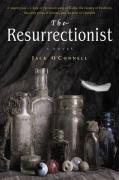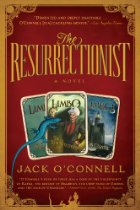The
thing that stands out about Jack
O'Connell is his sheer enthusiasm for the art and craft of writing. He
was in London
for a
brief visit, and an on-stage interview with Maxim Jakubowski, in
between
festivals in France,
where his books are popular, and Dublin,
which, as an Irish-American, he was thrilled to be visiting for the
first time.
As we reduced the world's stock of Guinness, and a bitter named The
Fall, with
impressive Biblical overtones, in an Irish pub nestled in a West
End
alley, O'Connell spun
out the pleasures of reading which, for him, grew into the pleasures of
writing. That we appeared to share the same tastes, indeed many of the
same
experiences with the same editions of the same paperbacks of our
younger days
meant the two hours became an exercise of head-shaking agreement, each
punctuated by another drink.
O'Connell
was born, educated, and
has spent his whole life in Worcester, Massachusetts ('within a
three-mile
radius, really'), which provides the geographical basis of his
fictional Quinsigamond,
but it is his reading that has provided Quinsigamond with its unique
mix of
rust-belt America, Weimar Germany, and futuristic LA. Although it's
easy to see
the influence of any number of modern cult-favourite writers in
O'Connell's
work, it is sui generis, never derivative, and at least two of his five
novels,
his first Box Nine, and his latest, The
Resurrectionist, deserve to stand alongside names like
Pynchon, DeLillo,
Disch, Dick, or and Burroughs.
Like
many cult writers, though,
none of O'Connell's books has found commercial success to match their
critical
acclaim. His problems may have started when Box
Nine, won the Mysterious Press first novel award. Prestigious
as the prize
was (and appreciated as the $50,000 prize was as well), it saw him
labeled as a
'crime writer', and although it fit into that category, it also
resisted it.
Genre labels don't quite work for O'Connell; there are significant
elements of
sf, and stylistic experiment which put much 'serious' fiction to shame,
which
makes it difficult for them to appeal to the 'hard core' crime reader,
while at
the same time making it almost impossible to reach beyond the genre
boundaries
created by the 'mystery' section of bookstore shelving.


Along
those lines, I noticed Jack
was carrying the new US
paperback edition of The
Resurrectionist, and I commented that the covers of that book
reflected his
dilemma of classification. Constant nodding in agreement and digressing
into
tangential concerns that seemed to be mutually apparent immediately....
JOC:
I loved that first cover (the US
cloth
edition), but the publisher thought it was not quite right.
MC:
It emphasized the circus/freak
show sub-plot; it reminded me of Glenn David Gold, or maybe a book like
The Prestige or The
Illusionist.
JOC:
And this cover (which features
cards) is along the same lines, but less mysterious. I think it
reflects part
of the problem with my books. I was doing a tour recently, and in Denver
I was
in the general fiction section, in Phoenix
I was
in crime, and in San
Francisco
I was in horror/sf...
MC:
Which might tell you more about San
Francisco
than
your books! But the British edition really looks great, like a
mainstream
novel, perhaps historical, that John Banville or someone might have
written.
Maybe we should call it 'slipstream'...
JOC:
No Exit have done a great job with
my covers...
MC:...and
they've always GOT
the book; the Box Nine cover is
much more sf than
anything else! I saw you mentioned Harlan Ellison as an early
influence. I
didn't see Ellison the writer as much as Ellison the editor, because
everything
you've written would fit nicely into Dangerous Visions.....
JOC:
Oh yeah. I loved those books,
Disch, Delany, Aldiss. I sort of stumbled into sf as a kid, but then
this stuff
seemed so radical, and those writers led me, naturally, to finding Gravity's Rainbow, and wow! There's an
anthology of stories out now, called The
Secret History of Science Fiction, and it's based on a piece
Jonathan
Lethem wrote about ten years ago, speculating on what would have
happened if
the Science Fiction Writers had voted the Nebula to Gravity's
Rainbow in 1973, when it was nominated, instead of Arthur
Clarke's Rendezvous With Rama. From Pynchon to Delany's Dhalgren was a
natural
step.
MC:
And where does the crime fiction
fit in?
JOC:
As a kid I loved Hammett and Chandler,
and
the next generation of pulp writers, the Jim Thompsons and David
Goodises. But
my first fictions were two Pynchon-type novels, long and dense, and
they never
sold. Then I did Box Nine, which is
at heart a dark city noir, and has a female detective, and after it
sold the
first question was, can you make it a series? Is the main character
coming
back? And I said 'sure', because in my mind the main character was the
city,
Quinsigamond, not the woman! Both my agent and the editors were
disappointed,
but I said, did you see where Leonore winds up at the end of the book?
And they
said, well, send her to rehab! From a strictly commercial point of view
they
were, as usual, righter than I was. I think the problem is that I'm
generally a
little too dense for the dedicated crime reader, and there's no way to
make the
jump to 'literary'. There have been some relatively brief windows into
what
they call the 'slipstream', the cultish books just off the mainstream,
but now my
attitude is I've written five books, I'm turning 50, and I'm just gonna
write
what I write. You never know what's going to come out...
MC:
The Resurrectionist is your first
book in nearly a decade. Was it
very carefully planned?
JOC
(laughing): Just the opposite!
Partly, I was working days, editing the alumni magazine at Holy Cross,
and I'd
get up at four
am
to write. But the first draft did not contain Limbo
((the comic book story which Sweeney reads to his comatose son)) and I
wrote it
in a white heat, in about 8 months, which all began after a cafe crawl
around
Poitiers, at a festival with Francois Guerif, or Rivage, my French
publisher.
It was inspired by the Gold Medal guys I love, particularly Gil Brewer,
and it
was the story of Sweeney and his son and the gang of bikers. I'd
written maybe
90% of it, and I was really excited and I sat down to write a simple
scene,
where Sweeney reads a comic to his son, and the questions started. I
took a
left turn. Six months later, the wife says 'how did it go?' and I say
'we're
going to have to get rid of Sweeney,' and she looks at me and says
'Let's not
do that, alright?'. But the Limbo story just grew and grew, and in the
end it
was double the length it is now in the book, as I had to select just
the best
bits.
MC:
How direct is the Gil Brewer
influence?
JOC:
It's partly conscious and partly
organic evolution. I knew from the beginning that the only thing I
wanted to do
was write, but I had this terror because it didn't seem a career option
to a
kid growing up in Worcester!
But it was the verve of those guys, the Brewers, and Ellisons,
and also Richard Matheson, which I wanted to emulate. Eventually, I was
able to
marry it to more metaphysical themes, and more epic scope, but it took
lots of
experimentation, false starts, and frustration; not least those two
novels
which are up in the attic somewhere. Box
Nine finally started to do it, I think by leaning more toward
the genre
electricity side of things.
MC:
The crime element of The Resurrectionist
is mainly one of character;
Sweeney is a real noir hero, he's disturbed, he's needy, and above all
he's
vulnerable, with a weak spot that the ruthless can take advantage of,
and
there's a black widow femme fatal, in Nadia, a seemingly virginal
blonde in
Alice and a creepy shrink, a Dr. Ampthor type, in her father...
JOC:
That's exactly on the money -- in
fact, when I was in Dunkerque, on my French tour, I gave a little Cliff
Notes
version of the difference between the hardboiled first generation
writers like
Hammett and Chandler and the noir second generation of Thompson and
Goodis and
as I described the shattered protagonist ripe for total destabilization
by the
object of desire, my mind flashed on Sweeney.
MC:
The book cries out for adaptation
too. The Limbo Comics, I'm amazed someone doesn't jump at adapting them
as
comics, it's very much like Alan Moore..
JOC:
And how great would that be!? Comics, and then the movies!
MC: I'll drink to that.
|







